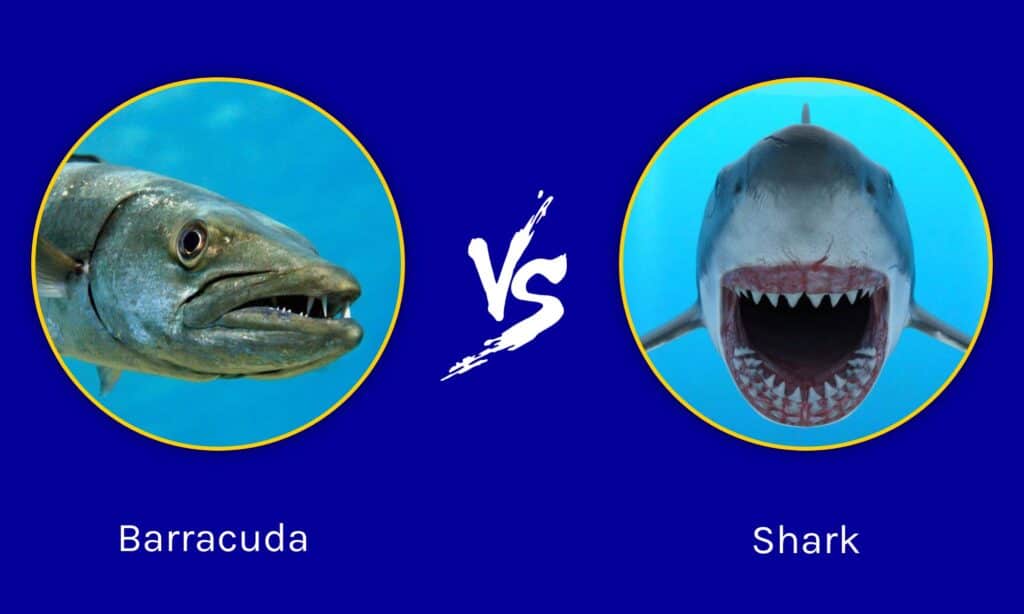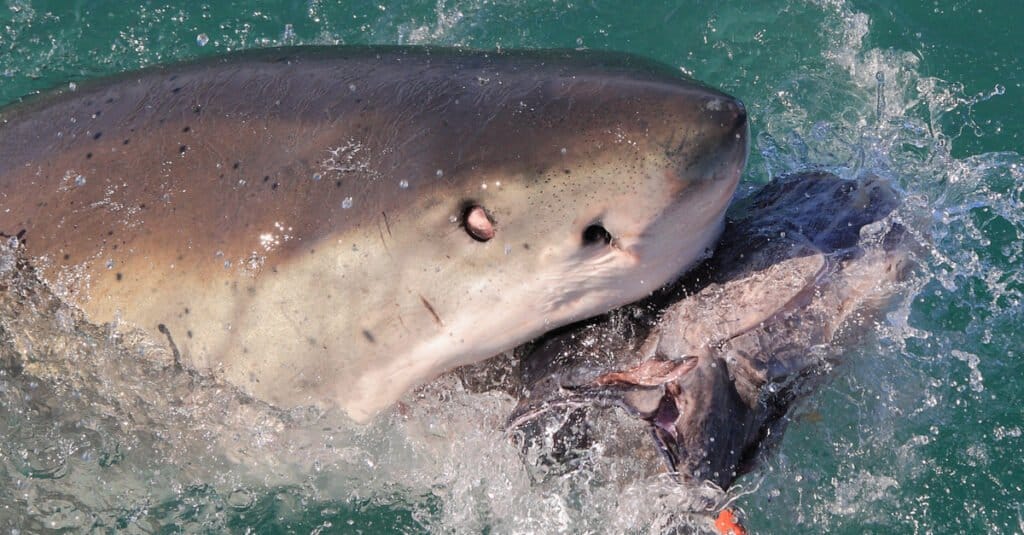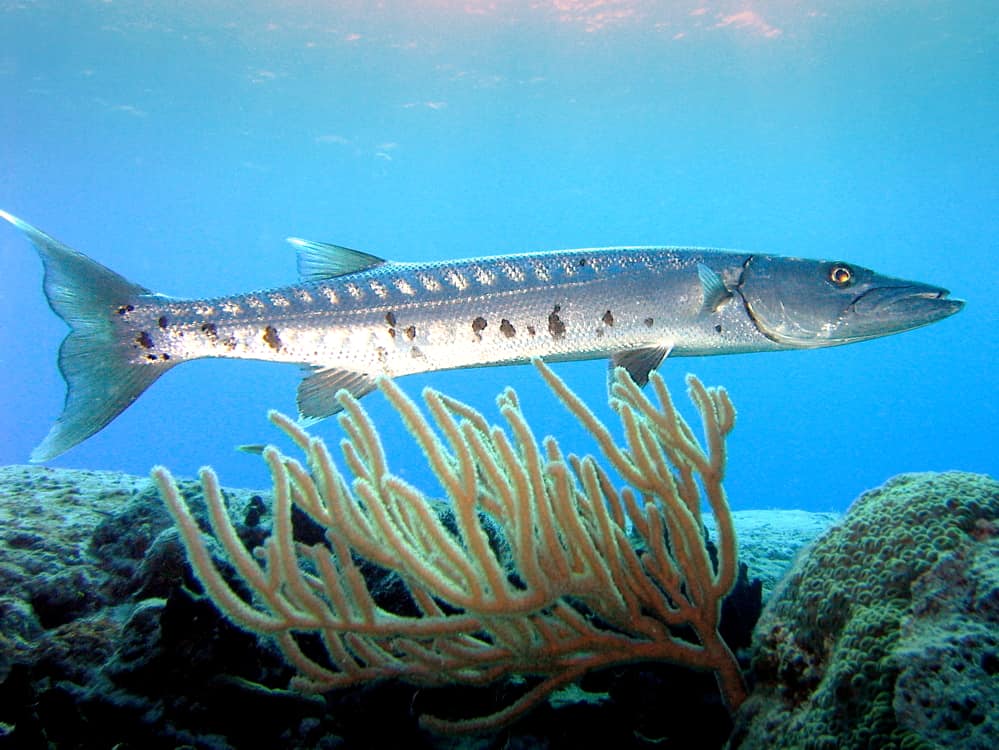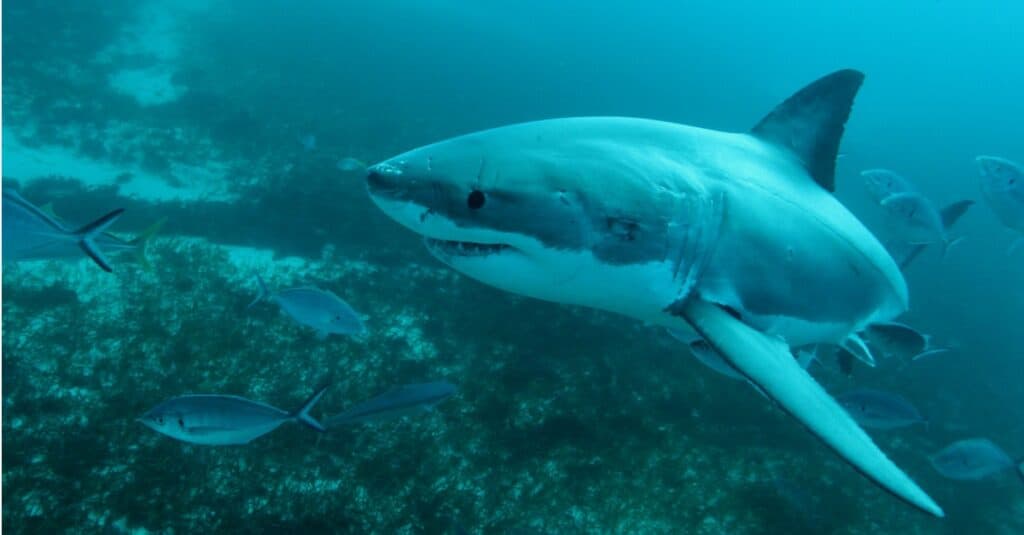The oceans are filled with all sorts of interesting fish. Among these marine animals are the barracudas. They’re widely feared for their habit of using test bites on shiny objects, including those worn by humans. Although they can get quite long and have powerful jaws, they’re also not the creature that people worry about the most in the depths of the water. Sharks are apex predators with hunting capabilities like few others. So, which animal is most dangerous in terms of a barracuda vs shark, and who would win in a fight?
Let’s look at how these two animals compare to each other in several ways, and then we’ll figure out who wins this battle! Just for the sake of clarity, this article uses a great white shark to compare with a barracuda.
Comparing a Barracuda and a Shark

| Barracuda | Shark | |
|---|---|---|
| Size | Weight: 2.5-53lbs Length: 1.7ft-6.5ft | Weight: 2,450lbs-5,000lbs Length: 18ft – 26ft |
| Speed and Movement Type | – 10 mph-35 mph | – 20 mph-35 mph – Undulating, side-to-side motion for the tail and body. |
| Defenses | – Swift speed – Some barracudas live in groups, especially when younger | – Large size – Bursts of swim speed – Great senses that help it find or avoid other animals |
| Offensive Capabilities | – Powerful jaws – Sharp teeth to capture prey, some of them angled backward to keep prey inside – Highly aggressive animals that test bite – Poor eyesight, but the animal bites when it sees scales in the sunlight | – 4000 PSI Bite Power – About 50 serrated teeth are available to bite in the first row, but 300 teeth overall – 2-4-inch-long teeth – Uses speed, size, and raw power to inflict devastating wounds on prey |
| Predatory Behavior | – Barracudas are opportunistic predators that spot and then attack prey near the reefs they call home – May hunt in groups as juveniles to eat schools of fish | – Both an opportunistic and ambush predator that often strikes from below an enemy |
What Are Key Differences Between a Barracuda and a Shark?

Sharks are powerful creatures that use cunning and devastating attacks.
©Alessandro De Maddalena/Shutterstock.com
The greatest differences between a barracuda and a shark are their size and morphology. Sharks are thickly built torpedo-shaped cartilaginous fish that can weigh 2,000lbs to 5,000lbs in some cases and grow up to 21 feet long. Barracudas are torpedo-shaped with a much smaller profile and jutting, teeth-filled lower jaws, weighing up to 53lbs and measuring up to about 6.5ft. Larger barracudas have been found in the wild, though.
These are the biggest differences between the creatures, and they both play significant roles in the battle. However, we need more information to definitively state which fish will win a fight against the other.
What Are the Key Factors in a Fight Between a Barracuda and a Shark?

Barracudas are long fish that viciously attack prey.
©Laban712 / Public domain, from Wikimedia Commons, the free media repository – License
The most important factors to consider in a fight between a barracuda and a shark include size, attack, defenses, speed, and predatory abilities. We’re going to look at these elements relative to each creature and then determine which of them is superior. After we assign advantages to an animal for each section, we’ll make our final determination for this fight’s winner.
Barracuda vs Shark: Size
Sharks are much larger than barracudas. Even if we used smaller animals like tiger sharks to compare against barracudas, sharks are very large animals. In this case, sharks can range in weight between 2,000lbs and 5,000lbs and grow as long as 21ft.
Barracudas often reach a maximum weight of about 50lbs or slightly more, and they can grow about 79 inches in length or about 6.5ft.
Sharks have the size advantage in this fight.
Barracuda vs Shark: Speed and Movement
Barracudas and sharks have similar top speeds. When they are trying to make a last effort to catch their prey, both sharks and barracudas reach about 35 mph in the water. That is very fast for sea creatures, especially when you consider a shark’s size.
However, neither animal swims at that speed all the time, but this top speed measure is important for figuring out which animal can initiate an attack.
Sharks and barracudas are tied for speed.
Barracuda vs Shark: Defenses
Sharks have great defenses in terms of their large size, amazing senses, and speed that help them get away from potential danger. Moreover, they have a limited camouflage where a creature above them sees their dark top, but an animal below them sees a bright white profile that could be hard to spot with sunlight streaming down.
Barracudas have good swim speed and the company of other members of their species in some cases. Young barracudas will often swim in schools to keep larger prey from killing them.
Sharks have the better defenses of the two animals.
Barracuda vs Shark: Offensive Capabilities
Sharks are apex predators in the ocean for a reason. The fiercest of these animals can bite with a devastating 4,000 PSI using over 50 serrated teeth that measure over 2 inches long. Sharks don’t simply float up to their prey and initiate an attack. Sharks smash into prey, disorienting them, following up with devastating bites.
Barracudas are known to be very aggressive and keen on getting food. They have powerful jaws and very sharp teeth that can easily tear into the flesh of other creatures. Once they have a hold of a smaller animal, it’s hard for them to get away due to some of their teeth being angled backward to keep the prey inside.
These animals are known for biting anything shiny that gets near them, even watches and necklaces on divers! Their poor eyesight makes it so any shiny object could be the scales of prey, and they won’t pass that up!
Sharks have a far more devastating and precise method of attack.
Barracuda vs Shark: Predatory Behavior
Sharks are amazing predators that have a whole host of senses to help them find and attack prey. They are both opportunistic and ambush predators. That means they will happen across prey to eat it in some cases, and they will ambush other animals with cunning strikes from below at other times.
Barracudas are simply opportunistic predators, but they are effective ones. They bite first and ask questions later, a method that yields food but can also lead to cases of mistaken identity.
Sharks have more finely tuned predatory behaviors compared with barracudas.
Who Would Win in a Fight Between a Barracuda and a Shark?

A great white shark would kill a barracuda along with many other animals in the ocean.
©iStock.com/Alessandro De Maddalena
A shark would win a fight against a barracuda. The apex predator has everything going, including size, speed, attack power, and defenses. The barracuda could potentially get the drop on the shark, but it’s very unlikely due to the latter’s superior senses.
The small profile of the barracuda lends itself to being on the receiving end of a devastating bite, too. With that in mind, it’s hard to imagine any scenario where a barracuda could do enough damage to a shark without the shark chomping on the barracuda.
A barracuda’s bite is relatively small compared to a shark’s and relies on holding prey in place. A thrashing, powerful shark would retaliate devastatingly and bring the fight to an end quickly.
All in all, the shark is the clear winner.
Who Could Beat a Shark in Battle?
When it comes to shark battles, there are certainly some animals that could give the sharks a run for their money. Large land predators such as bears and big cats like tigers and lions possess strength and agility that can be formidable opponents in the battle against a shark. They also have sharp claws and teeth, which aid them in combat. Even elephants, with their powerful trunks, could put up a fight if faced with a large enough shark.
In addition to larger land animals, smaller creatures like wolverines, honey badgers, or mongooses may stand a chance against some species of sharks if they band together in numbers. These small animals rely on strength in numbers since they lack the size of larger predators but still possess razor-sharp teeth and claws, which make them formidable adversaries when defending themselves from potential threats.
Ultimately though, regardless of how fierce any creature is on land when it comes down to an aquatic battle between two vastly different species, it’s hard not to favor the creature in their home turf!
The photo featured at the top of this post is © aquapix/Shutterstock.com
Thank you for reading! Have some feedback for us? Contact the AZ Animals editorial team.






